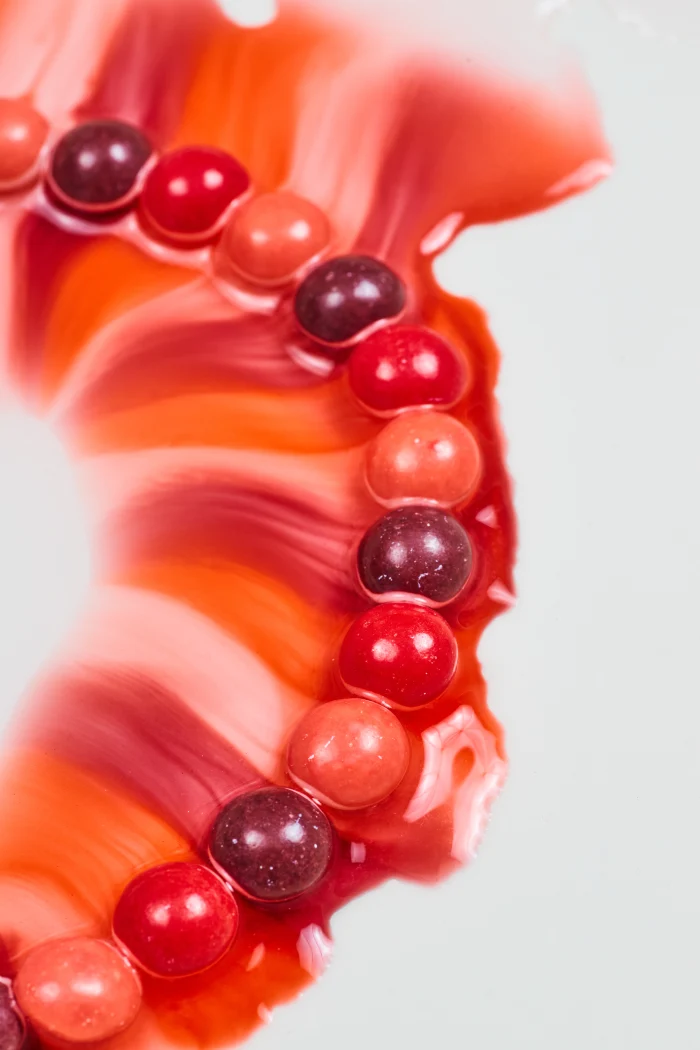Alright, folks! Buckle up because we’re about to dive into the wild world of meclofenamate! 🎢 Now, I know what you’re thinking – “Meclo-what-now?” Don’t worry, by the end of this article, you’ll be dropping “meclofenamate” into casual conversations like it’s no big deal. So, let’s get this party started!
The Lowdown on Meclofenamate: Your New Favorite Tongue Twister
Let’s face it, saying “meclofenamate” five times fast is probably harder than actually understanding what it is. But fear not, my health-savvy friends, because I’m here to break it down for you in a way that’s easier to swallow than, well, meclofenamate itself!
Meclofenamate, or as I like to call it, “Meclo” (we’re on a nickname basis now), is a non-steroidal anti-inflammatory drug (NSAID). It’s like the cool cousin of ibuprofen and naproxen, but with its own unique flair. Now, before you start thinking, “Great, another painkiller to add to my medicine cabinet,” hold your horses (pun intended, you’ll see why later)! Meclofenamate is not your average over-the-counter pain reliever.
The Secret Life of Meclofenamate Sodium

Now, let’s talk about meclofenamate sodium. It’s like meclofenamate, but with a little extra pizzazz. This is the form you’ll most likely encounter if you’re prescribed this medication. It’s the Clark Kent to meclofenamate’s Superman – same hero, different outfit.
Meclofenamate sodium comes in various strengths, but the most common is the meclofenamate 100 mg capsule. It’s like the Goldilocks of dosages – not too little, not too much, just right for most people’s needs. But remember, always follow your doctor’s instructions. They didn’t go through all those years of medical school just to have you ignore their advice!
What’s the Deal with Meclofenamate?
So, you’re probably wondering, “What is meclofenamate used for?” Well, buckle up, buttercup, because we’re about to take a wild ride through the world of meclofenamate uses!
1. Pain, Pain, Go Away!
First and foremost, meclofenamate is a pain reliever. It’s like that friend who always knows how to cheer you up when you’re feeling down. Got a headache? Meclofenamate’s got your back. Arthritis acting up? Meclo to the rescue!
2. Inflammation’s Worst Nightmare
Remember how I said it was an anti-inflammatory? Well, meclofenamate takes its job seriously. It’s like a tiny superhero, swooping in to fight inflammation wherever it finds it. Take that, swelling!
3. Period Problems? No Problem!
Ladies, listen up! One of the lesser-known but super helpful meclofenamate uses is for heavy periods. That’s right, meclofenamate for heavy periods is a thing! It can help reduce menstrual blood loss and cramps. It’s like having a personal bouncer for your uterus, keeping things under control.
4. Horsing Around
Here’s a fun fact for you: meclofenamate isn’t just for humans! Meclofenamate for horses is also a thing. That’s right, our equine friends can benefit from this wonder drug too. So next time you’re at the stables, you can impress everyone with your knowledge of horse pharmaceuticals. You’re welcome!
The Mechanism of Action: How Does Meclofenamate Work Its Magic?
Now, I know what you’re thinking. “Come on, health columnist friend, tell me about the meclofenamate mechanism of action!” Well, since you asked so nicely, let’s dive into the nitty-gritty.
Meclofenamate works by inhibiting the production of prostaglandins. Now, before your eyes glaze over at the mention of prostaglandins, let me break it down for you. Prostaglandins are like the body’s little messengers. They’re responsible for telling your body when to feel pain, when to swell up, and even when to start your period.

By putting a damper on prostaglandin production, meclofenamate essentially tells these messengers to take a hike. It’s like putting your body’s pain and inflammation signals on mute. Pretty cool, right?
But wait, there’s more! Meclofenamate also has a unique ability to increase the production of glycosaminoglycans. Now, that’s a mouthful, isn’t it? Glycosaminoglycans are important components of cartilage. So, by boosting their production, meclofenamate might actually help protect your joints. It’s like killing two birds with one stone – reducing pain and potentially slowing down joint damage. Talk about overachieving!
The Great Meclofenamate Hunt: Brand Names and Generics
Now, let’s talk about meclofenamate brand names. You might be scratching your head, thinking, “I’ve never seen ‘Meclofenamate’ on any pharmacy shelves!” Well, you’re not wrong. Meclofenamate is actually the generic name of the drug.
The brand name for meclofenamate used to be Meclomen. However, and this is where things get a bit tricky, Meclomen is no longer available in many countries, including the United States. It’s like the Elvis of pharmaceuticals – it left the building, but its legacy lives on.
But don’t worry! Just because the brand name isn’t around doesn’t mean you can’t get your hands on this wonder drug. Meclofenamate generic versions are still available with a prescription. It’s like getting the store brand cereal instead of the name brand – same great taste, less fancy packaging!
Show Me the Money: Meclofenamate Cost and Price
Now, let’s talk turkey. Or in this case, let’s talk meclofenamate cost. The price of meclofenamate can vary depending on a few factors, like your location, insurance coverage, and whether you’re getting the brand name (if available) or the generic version.
Generally speaking, the meclofenamate price for a month’s supply can range from about $50 to $100 for the generic version. Now, I know what you’re thinking – “That’s more than I pay for my Netflix subscription!” And you’re right. But remember, this isn’t just any old medication. It’s a specialized NSAID that can provide relief when other over-the-counter options just aren’t cutting it.
Plus, when you consider the potential benefits – less pain, reduced inflammation, maybe even lighter periods – it might just be worth every penny. It’s like investing in a really good mattress. Sure, it might cost more upfront, but the quality of life improvement? Priceless.
The Good, The Bad, and The Meclofenamate: Side Effects and Reviews
Alright, it’s time for some real talk. Like any medication, meclofenamate has its pros and cons. Let’s dive into some meclofenamate reviews and discuss those pesky meclofenamate side effects.
First, the good news. Many people who use meclofenamate report significant pain relief, especially for conditions like arthritis or menstrual cramps. Some users have described it as a “game-changer” for managing chronic pain. It’s like finding that perfect pair of shoes that make you feel like you’re walking on clouds.
But, and there’s always a but, isn’t there? Meclofenamate side effects can be a bit of a party pooper. Common side effects can include:

1. Upset stomach or nausea (it’s like a roller coaster for your tummy)
2. Dizziness (the room isn’t actually spinning, promise!)
3. Headache (oh, the irony of a painkiller causing a headache)
4. Diarrhea (let’s just say it might make you a frequent visitor to the porcelain throne)
In rare cases, more serious side effects can occur, like stomach ulcers or bleeding. It’s like playing Russian roulette with your digestive system. But don’t panic! These serious side effects are rare, and your doctor will monitor you closely if they prescribe meclofenamate.
How to Use Meclofenamate: A User’s Guide
Alright, so you’ve got your hands on some meclofenamate. Now what? Well, first things first, always follow your doctor’s instructions. They didn’t spend all those years in medical school for nothing!
Typically, meclofenamate is taken orally with a full glass of water. It’s usually prescribed to be taken 3-4 times a day, often with meals to reduce the risk of stomach upset. Think of it like feeding a gremlin – timing is everything!
For those of you using meclofenamate for heavy periods, your doctor might instruct you to start taking it at the beginning of your menstrual flow. It’s like calling in the cavalry right when the battle starts!
Remember, more is not always better. Stick to the prescribed dose. Taking too much meclofenamate is like eating too much cake – it might seem like a good idea at the time, but you’ll regret it later.
Meclofenamate: Not Just for Humans!
Remember when I mentioned meclofenamate for horses earlier? Well, let’s saddle up and dive into that topic! (See what I did there?)
In the veterinary world, meclofenamate is used to treat inflammation and pain in horses. It’s particularly useful for treating musculoskeletal disorders, which is just a fancy way of saying “my horse’s legs hurt.”
But here’s the kicker – the dosage for horses is much higher than for humans. We’re talking about 2.2 mg/kg body weight per day. So unless you’re secretly a centaur (and if you are, we need to talk), don’t even think about trying to use the horse version!
The Great Meclofenamate Debate: Is It Right for You?
Now, the million-dollar question: should you use meclofenamate? Well, as much as I’d love to give you a simple yes or no answer, it’s not that straightforward. (Is anything in life ever really straightforward?)
Meclofenamate can be a fantastic option for people dealing with chronic pain, heavy periods, or inflammatory conditions. It’s like having a secret weapon in your medicine cabinet. But it’s not for everyone.
If you have a history of stomach ulcers, are allergic to aspirin or other NSAIDs, or are in the third trimester of pregnancy, meclofenamate might not be your best bet. It’s like trying to fit a square peg in a round hole – sometimes, it just doesn’t work.
The best way to determine if meclofenamate is right for you is to have a chat with your doctor. They can weigh the potential benefits against the risks and help you make an informed decision. It’s like having a personal health consultant, minus the hefty price tag!
Meclofenamate: The Final Verdict
So, there you have it, folks! We’ve journeyed through the wild world of meclofenamate together. We’ve laughed, we’ve learned, and hopefully, we’ve gained a new appreciation for this tongue-twisting medication.
From its pain-relieving prowess to its inflammation-fighting skills, from its use in managing heavy periods to its applications in equine health, meclofenamate has shown itself to be a versatile and valuable medication. It’s like the Swiss Army knife of NSAIDs!
But remember, with great power comes great responsibility. Meclofenamate is a prescription medication for a reason. It’s not something to be taken lightly or without proper medical supervision. Think of it as the Beyoncé of medications – powerful, effective, but definitely not for amateur performers!
Whether you’re considering meclofenamate for yourself, or you’re just filing this information away for future trivia nights, I hope this deep dive into the world of meclofenamate has been both informative and entertaining. After all, who said learning about medications had to be boring?
So the next time someone asks you, “What is meclofenamate?”, you can wow them with your newfound knowledge. Just maybe practice pronouncing it a few times first. Trust me, it helps!
And remember, in the world of health and medicine, knowledge is power. So keep reading, keep learning, and most importantly, keep asking questions. Your body (and your doctor) will thank you for it!
Until next time, stay healthy, stay curious, and maybe give your local horse a pat on the back. After all, you now have something in common – you both know about meclofenamate!



